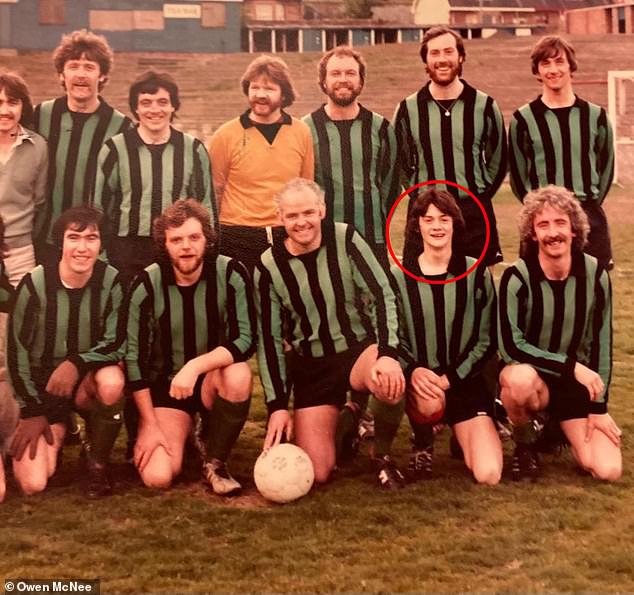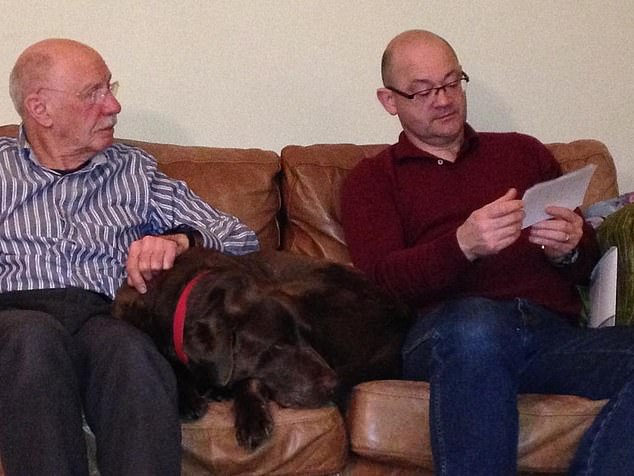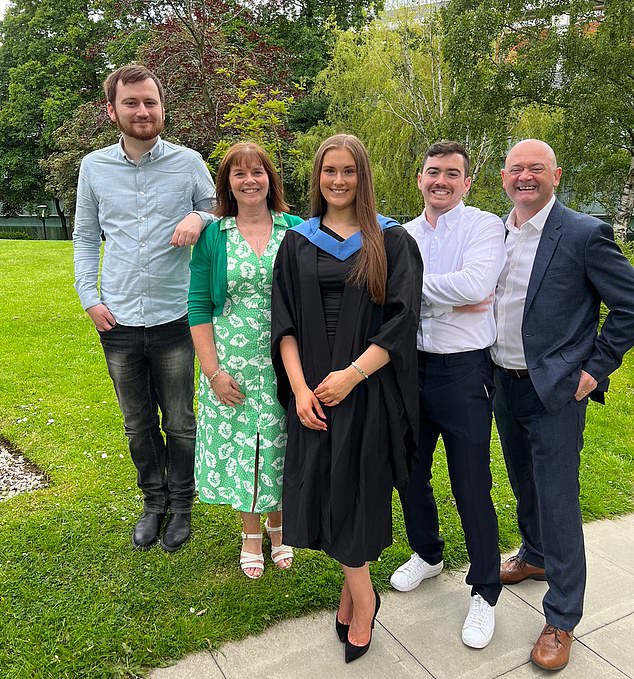It’s every bloke’s worst nightmare, prompting a pain so sharp and an embarrassment so overwhelming that it can bring the toughest man to his knees.
But for one miraculous cancer survivor, the dreadful experience of being kicked in the testicles saved his life, proving that even the darkest of clouds possess silver linings.
Owen McNee fell victim to the toe-curling ordeal during a game of football with friends in Glasgow in 1989, eight months after he had married his wife Lindsay.
The resulting lump led the then 26-year-old to visit his local GP, before being referred to hospital where tests eventually revealed testicular cancer.
Having caught the illness early, an operation removing the offending testicle paired with ten weeks of chemotherapy meant the cancer was gone within a year.
Now 62, Owen has set up a GoFundMe in memory of his father-in-law, who died just months after being diagnosed with myeloma, and will embark on a lengthy cycle ride to raise money for Myeloma UK.
Reflecting on his own battle with cancer, the retired chartered engineer admits he has his over-zealous pal to thank for a quick victory.
He told MailOnline: ‘I was [grateful he did it]. He was a big lad as well. David Williams was his name, six foot five.

Owen McNee, circled aged 16, had his life saved by a kick to the testicles while playing football
‘Big David…I kept telling him all about it after it.
‘It wasn’t the case where everybody was told to feel their nuts back then.
‘It was only because I felt sore and felt a hard lump and the GP, he was bang on, he said, “stay in the hospital”.’
Has he ever told his mate he saved his life?
‘I have. I actually went to watch them play football soon after and they were a man short, so I actually went onto the park, totally bald, with no hair on my body at all, to play football.
‘And I was exhausted. It was quite funny because there were wee kids at the side of the park shouting, “baldy, baldy”.
‘I’m baldy now but back then I was a 28-year-old baldy. It was funny because it was back in Easterhouse where I grew up and all these boys were like me.’
It’s perhaps little surprise that, post cancer, Owen has been keen to get back onto the pitch whenever he can, given the remarkable boost the initial kickabout had on his life expectancy.

The cancer sufferer pictured with his late father-in-law in whose memory he is cycling 35 miles for charity this year
That fateful day in 1989 did not have the hallmarks of a particularly unusual one for the footy fanatic as he gathered his stuff together for a typical fixture with his mates.
But several moments of extremely good fortune later and it soon became a match the Scot would never forget.
The first emerged the minute the group arrived, as they were forced into cancelling the planned game following a few drop-outs.
This pushed them onto a smaller five-a-side pitch as an alternative, perhaps a factor behind the painful collision which cut his involvement in the match short.
In agony, Owen visited the GP and then the hospital before being sent home with a clean bill of health.
But just one week later, he checked himself in again after his back grew sore. A further round of tests revealed he had cancer.
Owen had his testicle removed in a swift operation and was soon lying in the ward of a Victorian era hospital feeling rather sorry for himself.
‘Being just married, we were obviously very upset,’ he said. ‘Until a typical Glaswegian breathing oxygen in the bed beside us started singing, “Owen, he’s only got one ball, the other is in the surgeon’s hall”.

The father-of-three pictured, far right, with his family at his daughter’s graduation. The painful kick many years ago prompted him to have his testicles checked out, revealing he had cancer
‘This was through tears and everything else at this point.’
Further encouragement was to be found in the consistent positivity of an oncology professor at Glasgow University who figured the cancer had just a 20 per cent chance of returning.
‘He said: “It’s curable, even if it comes back,” and it did come back, and I had to do about a 12-week course of chemo – which was a week on and two weeks off.’
On top of the singing compatriot in the neighbouring bed, laughter often proved just the tonic for Owen as he battled through a miserable year.
‘There was always humour in what was happening but to be perfectly honest when the professor told me there was a cure then I just believed there was a cure. I didn’t have any doubt after that.
‘There were some issues moving through chemotherapy, including when we tried to play monopoly.
‘With chemotherapy you actually lose dexterity in your fingers and we ended up all of us killing ourselves laughing because we couldn’t pick up the pieces making the move.
‘I will always remember that. Most of the time, we’re in bed getting pumped full of this drug and then in the other times we actually tried to play a game and it was just daft.
‘You would pick up a house and it would skate across the table. It’s a fond memory of a hard time.’
Soon he was cancer-free. The speed with which the illness had been spotted had proved pivotal in his chances of survival.
‘It was gone after the chemo,’ Owen said.
‘It was a good cancer to get if you get it early enough. Any early cancer diagnosis is good.’
For the next five or six years, Owen became a test case for an anti-chemo sickness drug, with doctors keeping a keen eye to see if his lymph nodes grew – which they did not.
Making a habit of upsetting the odds, the cancer survivor was able to have a boy, named Scott, five years after receiving the all clear, despite being told ahead of his initial operation that this might prove impossible.
He then had two more, a boy and a girl. His youngest is 25, while the middle child is now 27.
Throughout the cancer ordeal, his wife Lindsay was a constant source of support.
‘She was always there,’ Owen added. ‘It was tougher for her, for my family, my sisters, brothers and their kids.’
Hell-bent on enjoying life after his miraculous recovery, Owen was ‘determined’ to retire by the age of 60 – an impressive feat he achieved two years ago – after becoming a partner at a consultant engineering firm.
He has now changed his sport of choice to cycling, regularly cycling with friends – but only if there is a cake or coffee available at the end of the route.
More importantly, Owen has became a serial fundraiser, regularly peddling to raise money over the last decade.
His latest challenge will see him cycle 35 miles in the Tour de 4, Sir Chris Hoy’s cancer charity initiative.
His father-in-law was a cyclist into his eighties, inspiring the challenge, and won several veterans races.
He died, aged 84, just six months after being diagnosed with myeloma, while Owen’s mother-in-law also died from throat cancer.
‘What disappointed me was that he degenerated so quickly,’ he said. ‘In his early 80s he had just bought a spin bike and was still doing the spin in the house.
‘It didn’t take very long and it was a lot of pain.’
The latest fundraiser is a variation on a 13-year tradition which started when the Olympic Games headed to the UK in 2012.
Owen added: ‘I’m doing it with one of my mates, Ian. We do go occasionally for a cycle, and me and a lot of other mates have been doing charity since 2012 when the Olympics was in London.
‘That year we cycled down to London and got there on the Saturday, and three of them ran the London Marathon on the Sunday.
‘But this is just something for me and my pal, just to go and maybe think about the people [affected]. Cancer is distinct from the other things that we’ve been doing cycling for.
‘[We’re particularly inspired by] Chris Hoy with him being a cyclist and stuff. We cycled in the velodrome, we had that experience.
‘We’re doing 35 miles. At 14 stone and six foot, it is quite hard going uphill.’












